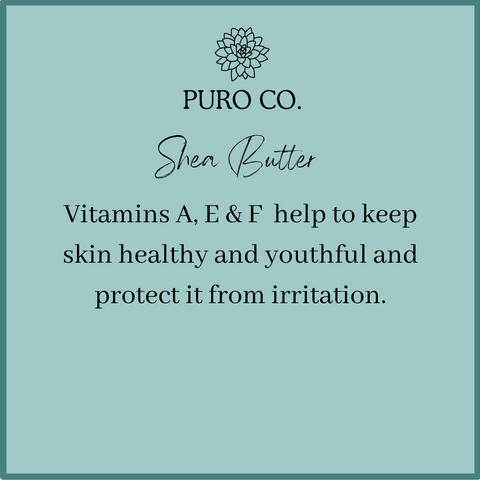
Shea Butter is a personal favorite at Puro Co. I use it daily, and I love adding it to our soap for its exceptional softening and moisturizing properties. Shea butter is ideal for sensitive or easily irritated skin because of its moisture and emollient properties. Find out why we love this ingredient so much.
What is Shea Butter?
The use of Shea butter dates back to Ancient Egypt, where Cleopatra is said to have regularly used Shea butter as part of her beauty regimen. Shea Butter has been used in Africa for many centuries to alleviate skin and scalp problems.
Shea butter is a fat derived from the shea nuts of the shea tree, also called the karate tree, which translates to "Tree of Life.", which grows in the western region of Africa. Shea butter is produced by grinding and cooking the nut of the Shea nut tree, then separating the oils to make shea butter. The butter produced is a yellow-ivory-colored, buttery, thick, and solid substance at room temperature. The butter is packed with essential fatty acids and vitamins and contains 60% fat, which makes it ideal for penetrating the skin.
Benefits of Shea Butter
Great for Sensitive Skin.
Shea Butter is great for irritated skin and can help to reduce inflammation. If you're someone whose skin gets irritated from traditional lotions and creams, shea butter may be a great alternative!

Seals in Moisture.
Dry skin can refer to the skin's lack of water or oil production.
Dehydration can result in dry, tight, flaky skin. For dehydrated skin, moisturizing products with a high percentage of water would be more beneficial than a thick heavy cream.
Skin lacking sebum production may also appear tight, dry, and rough. Sebum is the oily substance produced by the sebaceous gland, which is responsible for keeping the skin looking soft and supple and helps protect the skin against water loss. Sebum also makes up a portion of the acid mantle. The acid mantle contains sebum, lipids, and sweat which coats the surface with a pH of approximately 5.5 and helps protect it from environmental factors.

Shea Butter can be beneficial to both types of dry skin. Shea butter can form a protective layer on the skin and retain water, ensuring your skin remains hydrated and moisturized.
Soothes the Skin
Shea Butter is high in vitamins A & E and is excellent for irritated skin. The high cinnamic acid and fatty acid content are also helpful for inflammation. These properties make it a great option for eczema, weather irritated skin, eczema, psoriasis, and other skin issues that cause redness and irritation.
As a bonus, vitamins A & E also help promote youthful, healthy-looking skin.

Using Shea Butter
- An overall moisturizer. Anywhere your skin could use a little extra love, shea butter can help provide some additional moisture. Use it for hands, feet, or body.
- Soaps. Healthy skin starts with a great soap. Adding shea butter to the soap helps keep your skin healthy and moisturized and doesn't strip the skin of its natural oils. It also provides all the skin benefits that shea butter has to offer.
- Chapped Lips. Adding shea butter to lip balms helps keep your lips soft and supple.
- Dry Hair and Scalp. Shea Butter can be beneficial for the scalp and hair. It is heavy, so I recommend massaging a small amount into your scalp or combing it through your hair before you shampoo.
Purchasing The Best Shea Butter For Skin?
Quality always matters when it comes to skin benefits. The key when purchasing shea butter is to look for one that is unrefined. If you want all the benefits shea butter offers, you also wish to have raw shea butter.
Cautions with Shea Butter
There is a small risk of allergic reaction when using shea butter topically. If you experience any allergic reaction symptoms such as redness, itching, or swelling, stop using immediately and consult your doctor.
Do a patch test before using a new skincare product.
